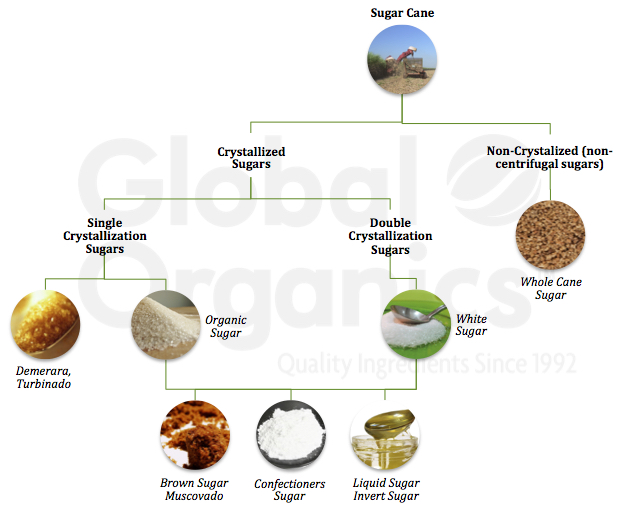Sugar and Cane: A Guide to Their Nutritional Benefits and Uses
Sugar and Cane: A Guide to Their Nutritional Benefits and Uses
Blog Article
Why Walking Stick Sugar Handling Chemicals Are Crucial for Modern Sugar Refining
The function of walking stick sugar handling chemicals in modern sugar refining can not be overemphasized, as they are essential to improving both the efficiency of extraction and the overall quality of the final item. Agents such as phosphoric acid and particular flocculants are used to eliminate impurities, leading to sugar that not only meets customer assumptions yet also follows market standards. The ramifications of these chemicals extend beyond top quality, touching upon market dynamics and ecological considerations. sugar and cane. This increases crucial inquiries concerning the sustainability of such techniques and their influence on the future of sugar production.
Function of Handling Chemicals
The effectiveness of cane sugar handling hinges significantly on the critical application of processing chemicals. These chemicals play a pivotal role in improving the effectiveness and high quality of sugar removal and refining. From the initial stages of juice removal to the last purification actions, processing chemicals assist in various crucial procedures.
In the removal phase, chemicals such as phosphoric acid and calcium hydroxide are employed to maximize the clarification procedure, helping to eliminate impurities and suspended solids from the walking cane juice. This not only improves the return however additionally makes certain the clarity of the final item. In addition, representatives like flocculants help in the fast settling of pollutants, thus simplifying the general process.
Activated carbon and ion exchange resins offer to eliminate shade and smell, guaranteeing that the polished sugar meets customer quality requirements. Thus, the precise selection and application of these chemicals are vital for achieving optimal outcomes in walking stick sugar handling.
Key Kinds Of Chemicals
Cane sugar handling relies on a variety of key chemicals that facilitate each phase of manufacturing. These chemicals play vital roles in clearing up, lightening, and purifying the sugar removed from cane.
One main group of chemicals consists of flocculants, such as polyacrylamide, which aid in the information process by promoting the gathering and settling of impurities. Furthermore, calcium hydroxide is frequently utilized to neutralize level of acidity and help in the removal of non-sugar elements.
Lightening agents, such as turned on carbon and sulfur dioxide, are used to decolorize the syrup, leading to a clearer final item. These chemicals assist remove color substances that may affect the sugar's appearance and marketability.
In addition, phosphoric acid works as a pH regulatory authority throughout the processing stages, making sure optimum problems for the enzymatic tasks associated with sugar extraction and filtration.
Other important agents consist of edta (ethylenediaminetetraacetic acid), which chelates metal ions that can militarize undesirable responses, and sodium hydroxide, which helps in pH control throughout the refining process. Jointly, these chemicals boost effectiveness and make certain a top quality cane sugar item.
Benefits for Sugar Top Quality
Commonly forgotten, the use of details processing chemicals significantly improves the overall top quality of cane sugar. These chemicals play an essential duty in refining procedures, making sure that the end product meets rigorous market requirements for pureness and taste.

Furthermore, refining chemicals aid in attaining a consistent granulation and appearance, which are essential for customer approval. By controlling the condensation procedure, these chemicals ensure that the sugar crystals develop uniformly, leading to a much more appealing item that liquifies well in numerous applications.
Additionally, using these chemicals can improve the life span of cane sugar by reducing moisture absorption and microbial growth. Generally, the tactical application of handling chemicals is essential for supplying high-grade walking cane sugar that fulfills consumer expectations and industry demands.
Ecological Effect Considerations

Additionally, the energy-intensive nature of sugar refining, compounded by chemical usage, typically leads to enhanced carbon exhausts. This adds to environment modification and elevates worries concerning the sustainability of current refining practices. Additionally, the sourcing of these chemicals might involve techniques that intimidate biodiversity, such as monoculture farming, which reduces the resilience pop over to this web-site of farming ecological communities.

To alleviate these effects, sugar refiners are increasingly discovering sustainable options and taking on best methods that reduce chemical usage. Executing extensive ecological management systems can aid ensure that the refining process straightens with environmental standards and promotes biodiversity. Ultimately, a balanced method that focuses on both sugar top quality and environmental stewardship is necessary for the lasting stability of the sugar industry.
Future Patterns in Refining
As the sugar industry faces the environmental difficulties connected with traditional refining approaches, ingenious approaches are emerging to enhance both effectiveness and sustainability. One significant trend is the fostering of eco-friendly chemistry principles, which prioritize using safe, naturally degradable handling chemicals. This shift not only reduces environmental effect however also addresses consumer demand for cleaner manufacturing methods.
Another encouraging development is the application of innovative filtering technologies, such as membrane layer splitting up and adsorption processes. These strategies improve the clarity and quality of the sugar while reducing the quantity of wastewater produced throughout refining. Furthermore, the assimilation of electronic technologies, including IoT and AI, is transforming operational effectiveness by making it possible for real-time surveillance and anticipating maintenance, therefore minimizing source waste.
In addition, the usage of by-products from sugar refining, such as bagasse and molasses, is gaining traction. These materials can be transformed into biofuels or value-added items, contributing to a circular economy within the sector. Jointly, these trends indicate a change in the direction of even more sustainable practices that not only enhance operational effectiveness however also straighten with global sustainability goals, ensuring the future stability of sugar refining.
Verdict
Walking stick sugar handling chemicals are vital in contemporary sugar refining, significantly enhancing the effectiveness and quality of sugar removal. The critical use of these chemicals not just improves the pureness and flavor of the end product yet likewise guarantees constant formation and appearance. As the industry significantly prioritizes sustainability, the adoption of environmentally-friendly processing representatives is most likely to shape future patterns in refining, inevitably resulting in higher high quality items and extended service life for consumers.

Eventually, a well balanced approach that focuses on both sugar high quality and ecological stewardship is important for the long-lasting practicality of the sugar market.
Walking stick sugar handling chemicals are important in modern sugar refining, considerably improving the effectiveness and top quality of sugar extraction.
Report this page